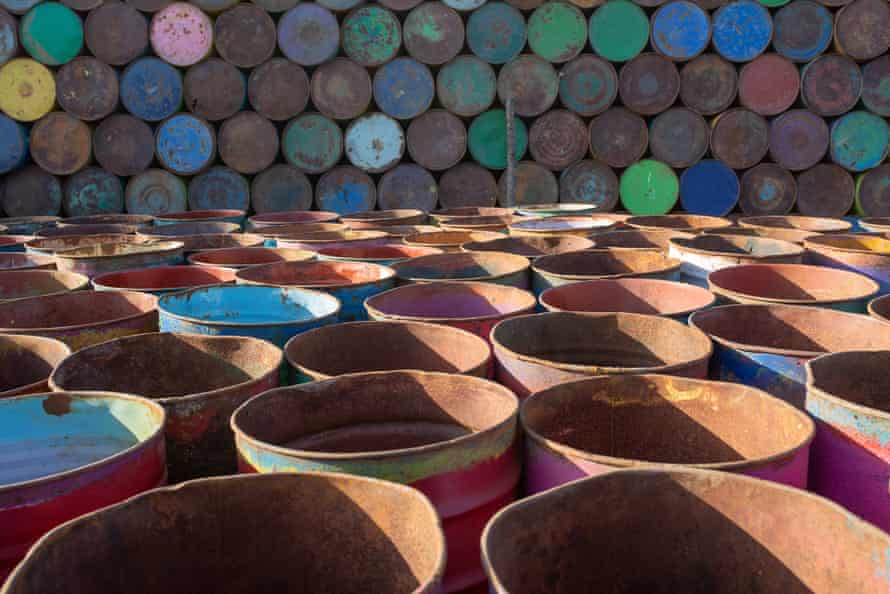At the end of May each festival year, Holly Larkin arrives at Worthy Farm to find a vast, rusting pile of metal bins, and starts to feel excited.
She leads a team of about 90 volunteer bin painters, all of whom travel to the Glastonbury festival site to spend two weeks painting an estimated 17,000 bins, all taken from a gigantic pile that is so vast it can be seen on Google maps.
Another group of 10 professional painters work on-site from April, and between them and Larkin’s team, they set about painting not only bins, but also concrete benches and murals. The idea is that beautifying the bins will encourage punters to honour the festival’s mantra of “love the farm, leave no trace”.
Like a misplaced chain gang, the “binnies” roam across the site for weeks splashing base paint across metal barrels and detailing designs on bins that line almost every field of the festival. The aesthetic payoff is enormous; one wonders how punters can even focus on the performances with such tantalising waste disposal on display.
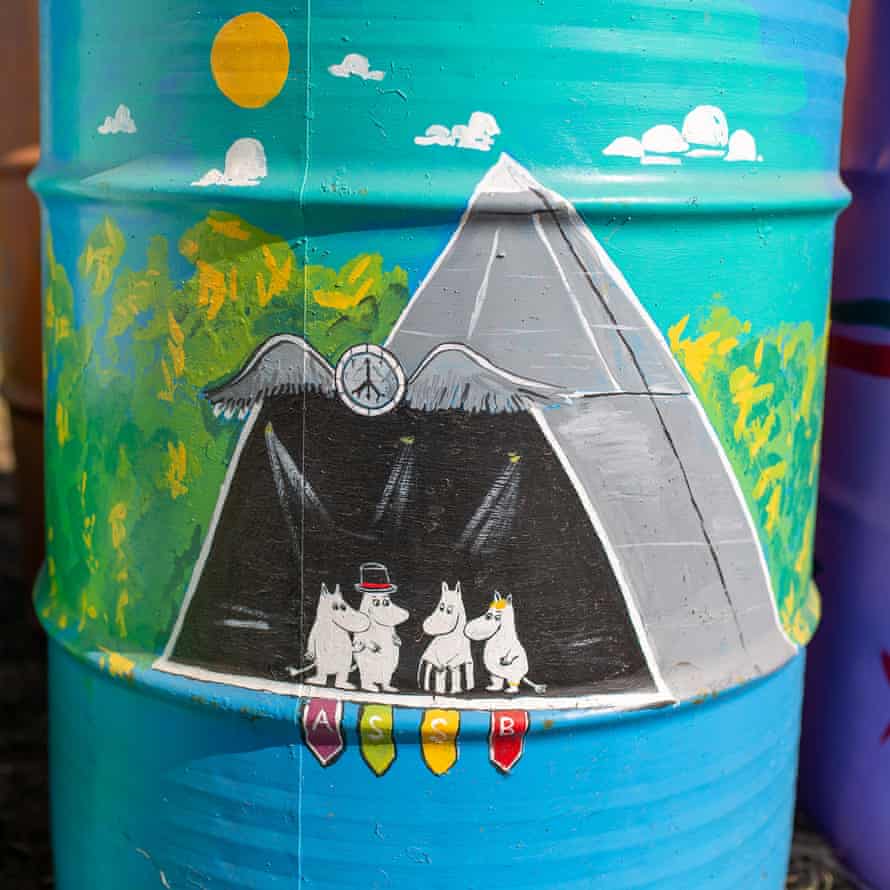
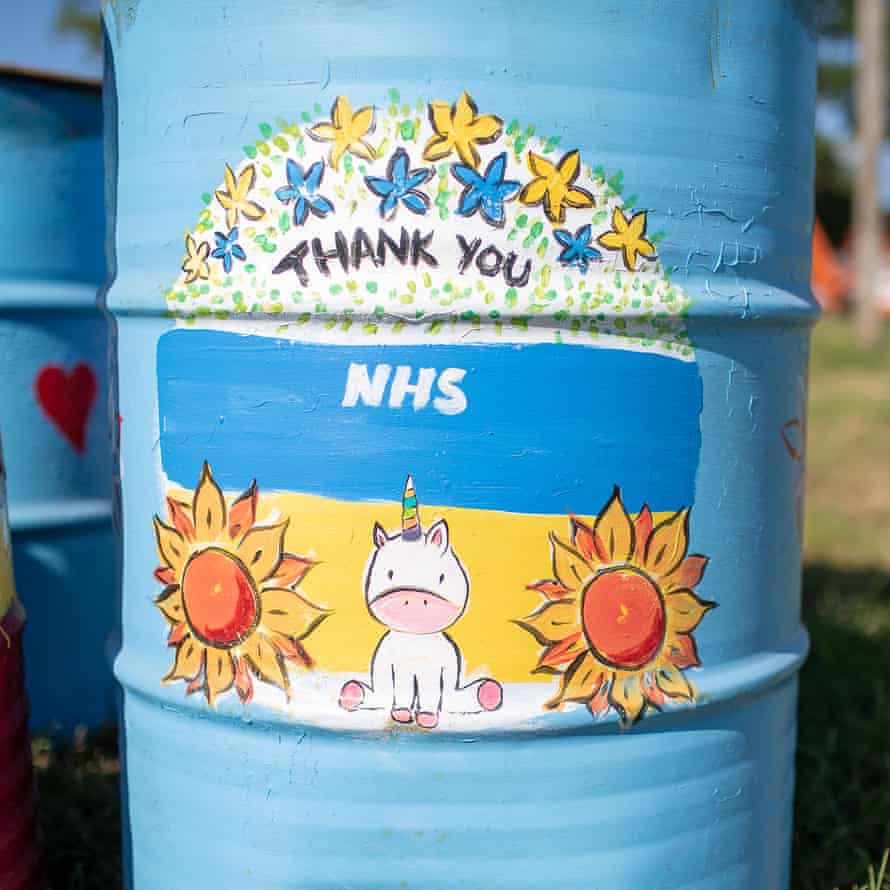
Few represent the spirit of bin painting more than Dantastic Glastonbury, who changed his name by deed poll and married his partner Emily, a fellow bin painter, during the festival. He also runs a charity fundraiser that sees people donate in return for personalised bin murals, including oddball designs such as Michael Eavis and Yoda riding a giant fire-breathing badger.
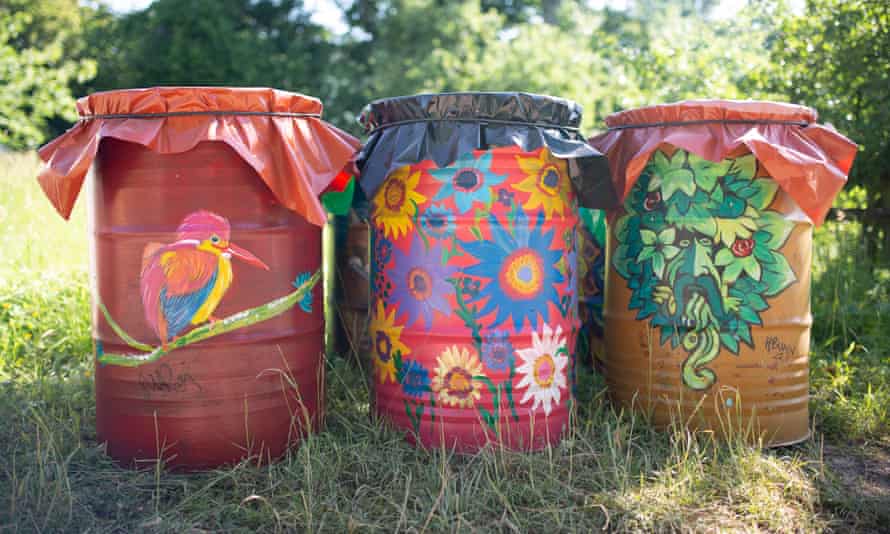
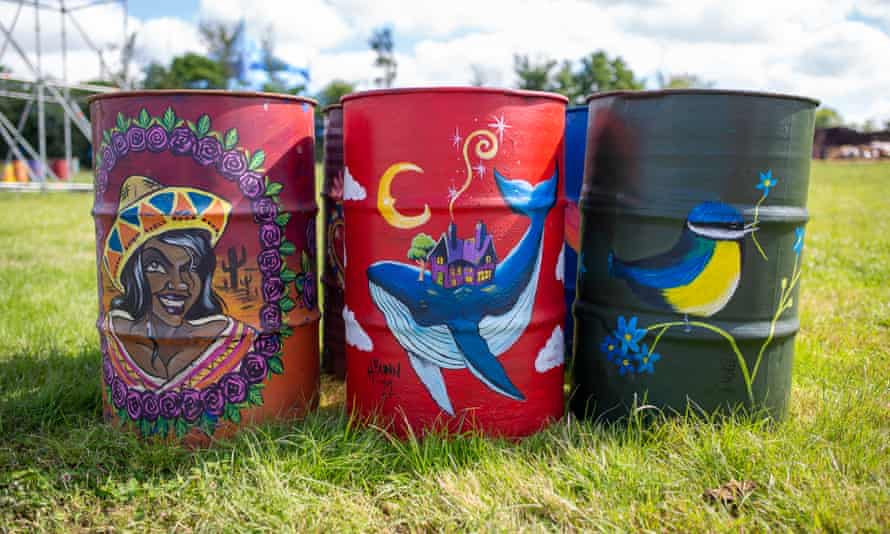
One must never underestimate how much Glastonbury means to people, and the bin painters are no exception, especially after a three-year break. Jon Ward, a 50-year-old artist, gardener and organiser of bumblebee workshops, said: “Coming back was hugely emotional. Each morning as I walk to the showers at 6am, I could start crying looking across the site to think I’m actually back. There was a point when I thought I’d never be back here again.”
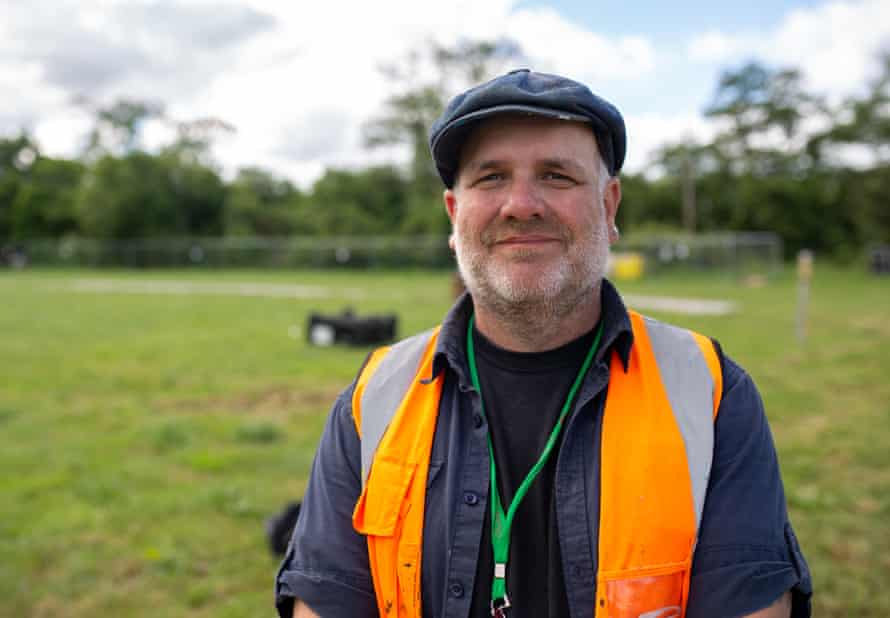
“Last night, I slept all through the night without any worries, which has been unusual over the last two years,” he adds. “I’ve enjoyed just being with people again.”
Hank takes the hallowed title of original bin painter. In the 1980s, he painted designs on a metal drum used to hold flowers on the main stage. Michael Eavis took notice and asked for more. Since then, Glastonbury’s bins have grown in number massively, made it into America’s Rock and Roll Hall of Fame, and entered the festival’s archive in the Victoria and Albert Museum.
There’s an abundance of humour and creativity among the volunteers. David Chadwick, affectionately known as Caravan Dave, lists biscuit-themed bins such as Lionel Richtea in the market area as among his favourites. “I find the bin paint probably more enjoyable than the festival,” he says. “It’s a better experience seeing it all come together … I wouldn’t really want to come as a punter after being a bin painter.”
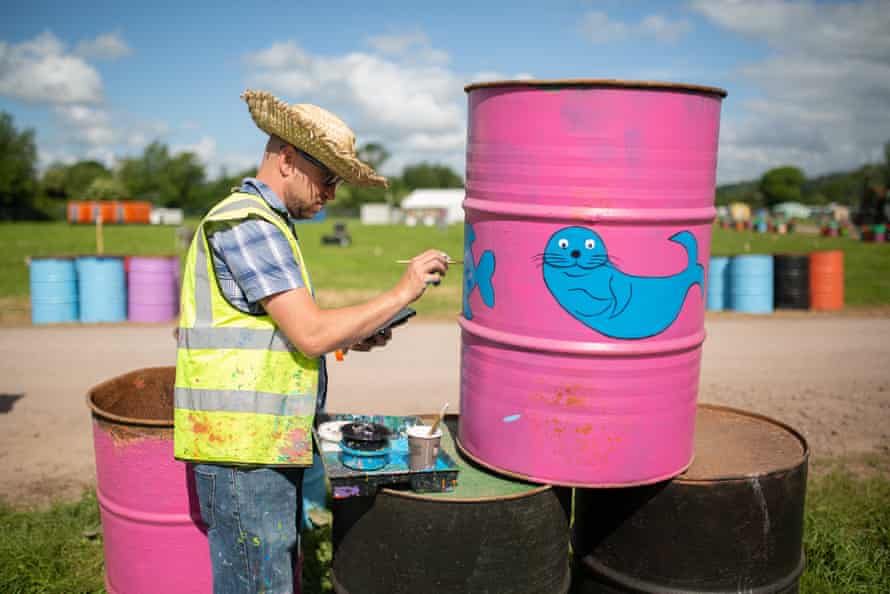
The bin painting culture also comes with its own punning phraseology: “How’ve you bin?” serves as the go-to question after years apart; team supervisors carry laminated artwork examples for “binspiration”; there’s also a “binformation” board in the bin painters camp, where volunteers can sip beers from The Painter’s Ruin and perform each year in Binnies’ Got Talent.
Bethany Stenning, a musician who lives in Bristol, played one of her earliest shows at the talent event. This year, she will perform with Ishmael Ensemble as they open the West Holts stage on Sunday. She gets a free ticket to the festival, but came back to volunteer as a bin painter nonetheless. “The community is very special. Everyone is full of compassion,” she says. “Bin painting definitely feels like a family and a home.”
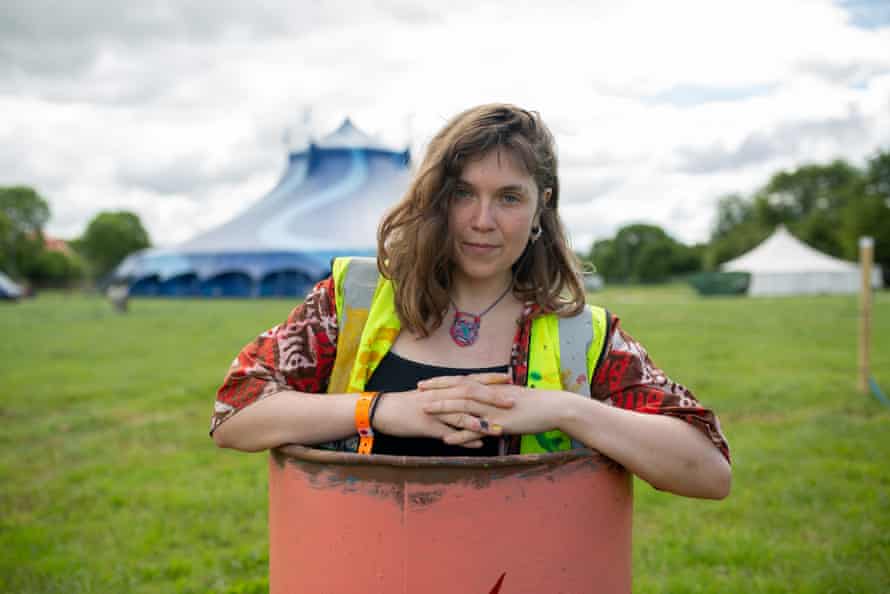
-
Bethany Stenning, a bin painter who will perform with Ishmael Ensemble at the West Holts stage on Sunday morning, peeks out from inside a bin.
Certain aspects of bin painting feel oddly reminiscent of Alex Garland’s The Beach. Like the novel’s community of islanders, volunteers only discover bin painting through word-of-mouth recommendations. There are also occasional trips back to civilisation for supplies; entering the big Tesco superstore in Shepton Mallet can feel like leaving utopia and venturing into a sanitised capitalist nightmare.
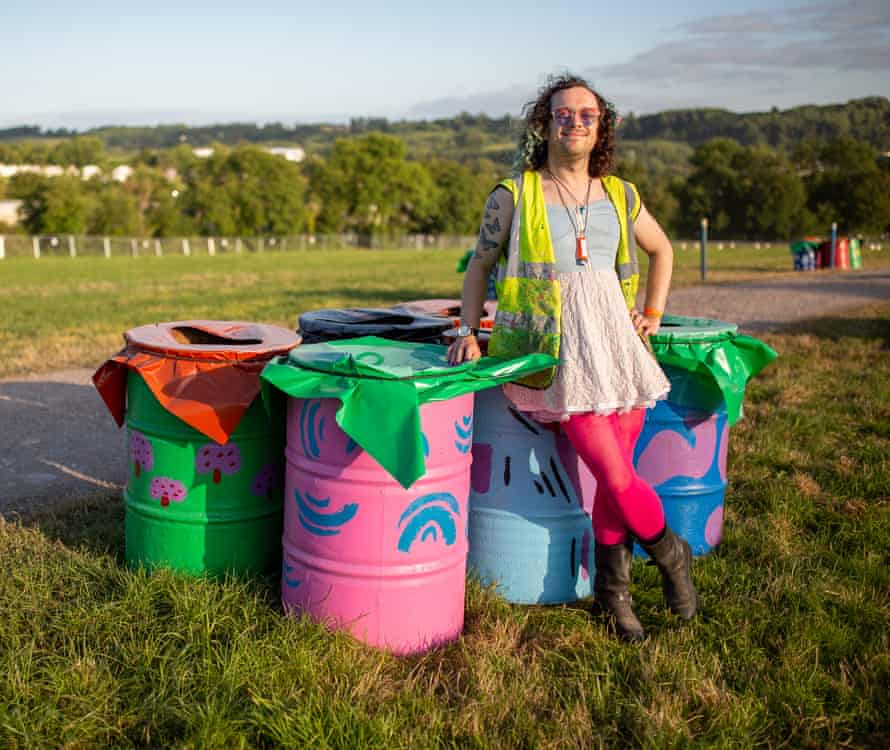
Bertram Holt, also known as Bertram: That Geezabird, a non-binary aspiring poet and rapper, says becoming a bin painter proved transformational. “I’ve grown so much as a person through coming here; my ability to be open about my identity is hugely connected to this,” Holt says. “The gender confusion was always there, but it wasn’t until I started coming to Glastonbury that I began to feel more confident as a person … This is a supportive place where there is minimal judgment.”
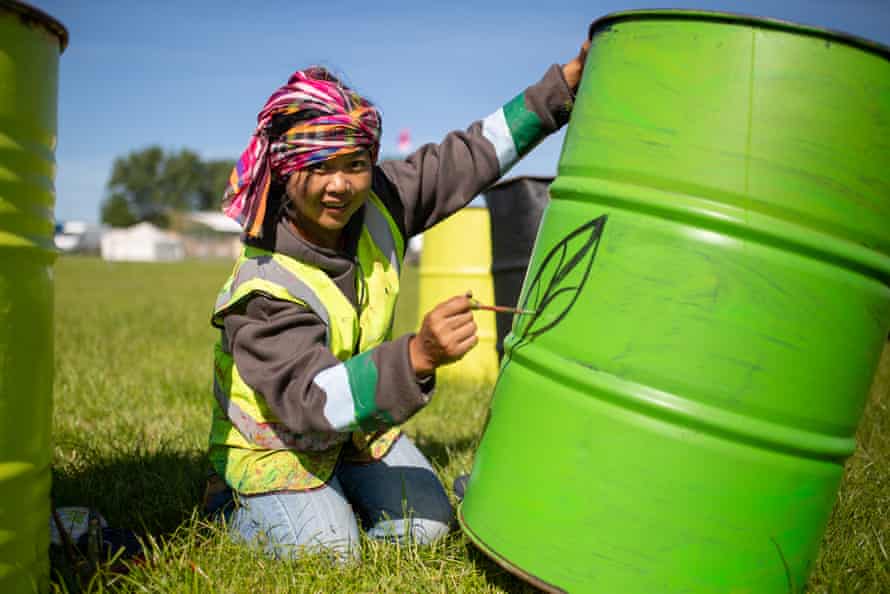
-
Ameli ‘Ae’ Westbrook, a Thai volunteer, travelled all the way from south-east Asia to paint bins.
Ameli “Ae” Westbrook, a journalism lecturer from Thailand, travelled all the way from south-east Asia to join the crew. “I’m so happy to be part of the bin painter family,” she says. “This is a wonderful idea. Bin painters make my holiday full of love and happiness.”
Others live mere miles away. Debbie, 56, and Simon Lodge, 55, who live in nearby Pilton village, get a ticket for the festival as local residents, yet still volunteer. “It has a special feeling to it. Even when the festival is not here,” says Debbie, before adding simply: “Bin painting is just great fun, isn’t it? What more fun can you have in a field?”
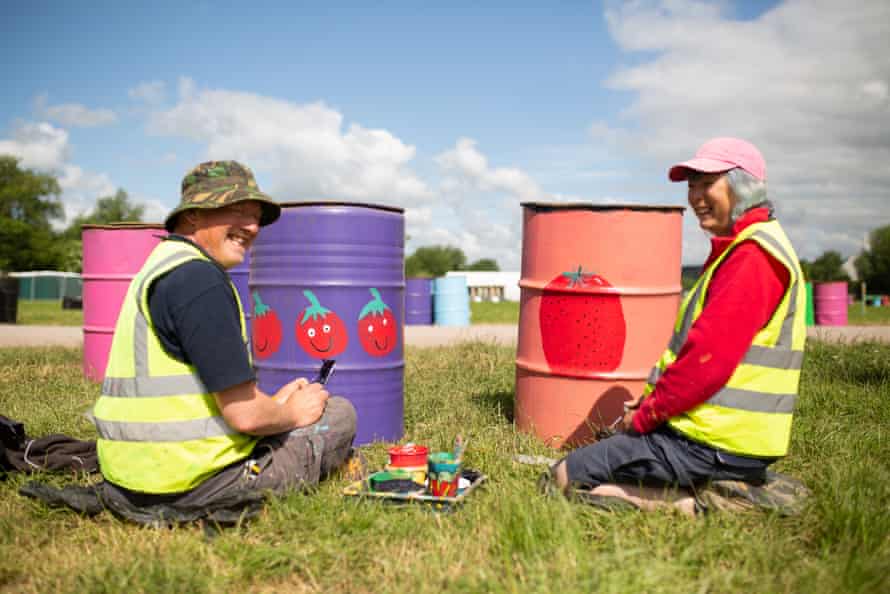
-
Simon and Debbie Lodge, residents of Pilton village, paint fruity designs on bins in the market field.
Shortly before the final days of bin painting, Holly Larkin feels proud. “We’re like a family,” she says. And as the painters gathered for this year’s Binnies’ Got Talent on Thursday, with singing and poetry alongside Shakespearean monologues and Thai dance, Ali, one of the performers, turns to the crowd and said: “I don’t know about you, but I belong here.”

